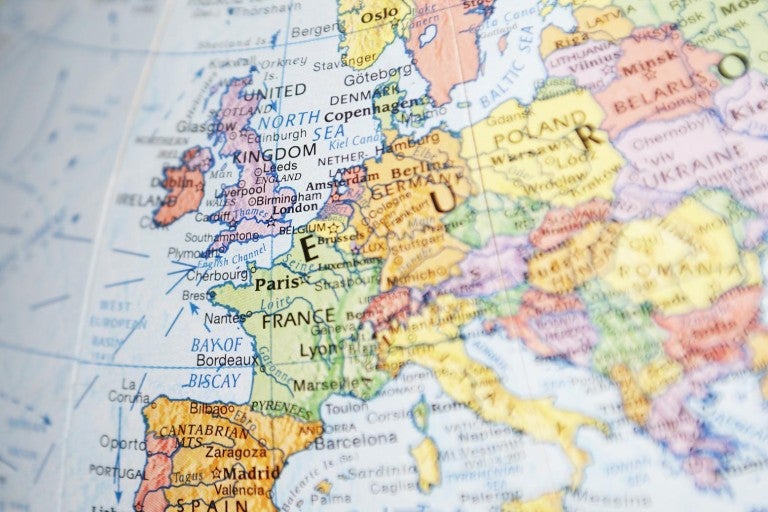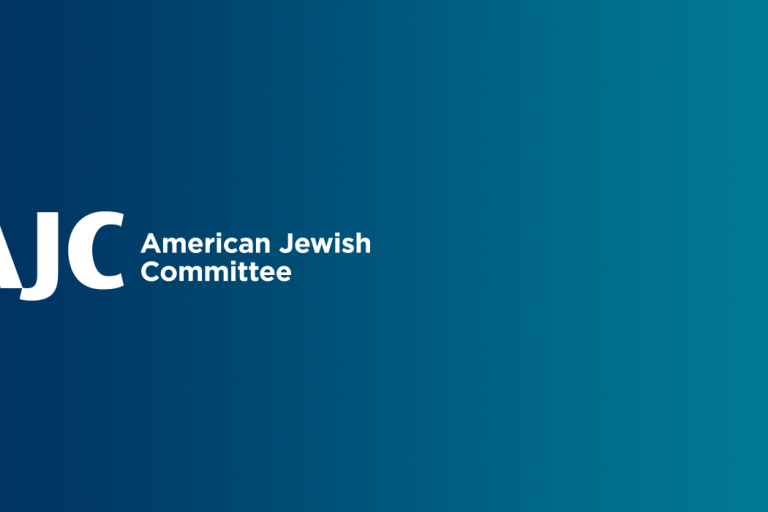January 25, 2016
(NOTE: Rabbi Baker was invited to participate at the International Holocaust Remembrance Day, organized at UNESCO on January 27, 2016)
As we observe International Holocaust Remembrance Day we are reminded that in 1938 there were over nine million Jews living in Europe. Today that number is less than one and one-half million. Hitler came very close to succeeding in his goal to make Europe “Judenrein.” It is a testament to both the resiliency of Jewish life and the postwar vision of a united and democratic Europe that Jews were able to rebuild their lives on the ashes of so many victims in what until recently seemed to be a new and genuinely tolerant landscape. But we may very well be at a critical turning point in this postwar, post-Holocaust era.
I will not draw any comparisons to the 1930s. Today there is no European government that promotes antisemitism. Attitude surveys show that substantial majorities of the general population have positive views of Jews. But right-wing, populist parties are finding new support in today’s depressed economic climate, and the leaders and supporters of those parties do harbor a greater degree of antisemitism.
Increasingly, anti-Zionism has become a mask for antisemitism. The State of Israel itself is demonized and its very legitimacy called into question, which is another form of antisemitism. And Jewish communities in Europe are frequently conflated with Israel and held responsible for its actions.
There is also a special problem in parts of Europe, as German Chancellor Angela Merkel recently pointed out, with heightened antisemitism among young people whose origins are countries where hatred of Israel and the hatred of Jews is widespread.
Thus, there is a very real challenge facing European governments today.
Europe’s largest Jewish communities—particularly France and the United Kingdom—have well established security organizations that work closely with and receive support from government authorities. In the aftermath of last year’s attacks more governments have thankfully come to recognize that the dangers are real and have stepped up their support. Today, heavily armed and trained police patrol in front of the synagogues and Jewish schools of Denmark and Sweden. In France and Belgium the military has been mobilized to protect these same sites. In the Netherlands mobile police trailers have been erected in front of Jewish community buildings, although the police inside will not respond directly. They are there to deter and call for special police units if they are needed. Jewish communities are appreciative of these steps, but they also report that security decisions are taken without their consultation. And to my knowledge there has been no real comparison made of these various approaches to determine what are the most efficient and effective.
Last year the French Prime Minister unveiled a new and comprehensive plan to fight racism and antisemitism in his country. Legislation was amended to make it easier to prosecute proponents of hate speech. Prosecutors and courts took steps to demonstrate that they can move quickly to punish racists and antisemites. There will be new efforts in the field of education, including changes and additions to the national curricula, to foster a greater understanding of religious minorities and also to promote civil values. These are welcomed steps and can in some ways serve as a model for other countries. But at the same time there are considerable forces that will be hard to overcome. The educational bureaucracy will likely hamper efforts to make real changes in the classroom. And of course France’s commitment to the principle of laicité which forbids classifications based on religion or race also makes it difficult for authorities to identify the perpetrators of antisemitic incidents or the special burden that Jews now shoulder. The advice offered recently by some French Jewish leaders for Jews in the interest of personal safety not to wear kippot in public was met with defiant responses by not only other Jews but by the President of the Republic. Heartening though this may be who could have imagined such a debate twenty years ago?
In December 2014, the 57 participating States of the Organization for Security and Cooperation in Europe (OSCE) adopted a Ministerial Declaration on Enhancing Efforts to Combat Antisemitism. It stated, “We express our concern at the disconcerting number of antisemitic incidents that continue to take place in the OSCE area and remain a challenge to stability and security.” It went on to say, “We stress the importance of States collaborating with civil society through effective partnerships and strengthened dialogue and cooperation on combating antisemitism.”
Main concerns
With this declaration in mind and taking special note of the lethal attacks on Jews that shortly thereafter occurred in Paris and Copenhagen and an impending attack that was thwarted by authorities in Brussels, Jewish community leaders gathered in Vienna last spring and enumerated their concerns:
- The threat has changed to include the possibility of attacks by radical, Islamist extremists who are determined to murder Jews.
- European governments have an elemental responsibility to protect their citizens.
- There is need for funding to bolster physical security at Jewish institutions. While some countries (Austria, France, Germany and the UK were cited) have stepped up, most have not.
- Police and law enforcement need to provide additional protection.
- Where special measures have been taken to mobilize large numbers of police or military, the question of long-term sustainability remains.
- There must be better two-way communication between Jewish community security personnel and law enforcement authorities.
- Jewish communities themselves must improve their own preparedness and professionalism in addressing these security concerns.
- Governments should consider appointing a special coordinator who can address the multiple problems here identified and marshal the support of all the relevant ministries.
- While noting with appreciation that there is generally strong understanding by political leaders for these problems, there is far less support from civil society at large, and much more must be done to address this.
- One cannot ignore the subject of Israel. Anti-Israel demonstrations have turned antisemitic; local Jewish communities are conflated with Israel and targeted directly; and European Jewish communities are increasingly pressured to refrain from voicing public support for Israel.
In the months that followed we have also witnessed an influx of migrants and refugees from Syria and Iraq and other countries in the region coming into Europe and eliciting very different reactions from both political leaders and civil society. Some were quite welcoming of these refugees while others clearly were not. But it was especially heartwarming to see so many private citizens organizing and greeting these refugees at train stations and helping them along the way.
As Jews we know what it means to be a refugee, and European Jews in particular know what it means for the gates to be closed in a time of need. Many individual Jews and Jewish community organizations have participated in efforts to assist these refugees fleeing from ISIS and other tyrannies. But, we also recognize the challenges that European governments now face in absorbing over a million people who have come during this year alone. And those challenges are not just about addressing the physical demands for housing and basic welfare. For many of these new arrivals the values of Western, democratic and largely secular societies with commitments to pluralism and gender equality are also alien, and therefore they must also be a part of any comprehensive acculturation process. But, let us also recognize that those same Middle Eastern societies they have left behind are often antisemitic and anti-Israel, and with no distinction made between the two. Thus, European governments need to be particularly mindful that special efforts will be needed to combat these inherited prejudices. Left alone they will only further increase antisemitism and Jewish uncertainty about the future.
Taking the problem seriously
In 2013 the OSCE organized an Expert Conference on Addressing the Security Needs of Jewish Communities in Berlin. Since then we have witnessed significant increases in antisemitic incidents--many of them violent--in a number of European countries.
We have the benefit of the EU Agency for Fundamental Rights (FRA) survey of Jews in eight EU countries (released November 2013) showing large percentages fearful of attacks, avoiding wearing Jewish signs or symbols, and sizeable numbers contemplating emigration. My own recent OSCE official visits have included countries—Denmark and France—that witnessed lethal attacks last year by radical, Islamic extremists that left no doubt that Jews and Jewish institutions are targets.
The anxieties that many Jews now feel about their safety and questions about their future are at a level that we have not witnessed in decades. By way of example, a front page story in Le Monde in January 2015 was titled, “The Jews of France: The Temptation to Leave.” This has been a topic of intense discussion since then.
Many of the recommendations of that expert conference clearly focused on these security threats: Provide protection; Assess security needs and provide financial support; Set up mechanisms of cooperation and communication between (law enforcement) authorities and Jewish communities; Engage in regular consultations and exchange information about threats; If major incidents occur send messages of reassurance to those communities.
For various reasons such as budget constraints or reluctance to provide more support for one religious community than another some governments chose to ignore them. Had they acted on them at the time perhaps some of these tragedies might have been averted. But there can no longer be any excuse or delay in taking this problem seriously.
I was astonished during my visit to Copenhagen in September, 2014 that government authorities rebuffed the request from Jewish communities to position policemen in front of the synagogue and the Jewish school, a common practice in many countries. Those authorities told me that they had a “relaxed approach” to security and they must consider that the general population would be disturbed if they saw armed guards in front of buildings.
The threat today of radicalized, Islamic extremists is now recognized as one of the most serious challenges confronting European governments. It has also now been acknowledged that Jews are high on the list of these terrorists’ targets. Evidence now suggests that the terrorist who murdered Jews in the Kosher Supermarket in Paris had initially planned to target a Jewish school in the suburbs with the plan to kill Jewish children. In Copenhagen the terrorist who first shot up a conference that focused on freedom of speech sought out the synagogue that night for his next target.
After the Paris attacks the French President and Prime Minister spoke clearly—the attack on the kosher market was an act of antisemitism by a radical, Islamic extremist. They attended memorial services for the victims. They called out the military to ensure that there would be adequate protection for all Jewish institutions.
But some governments also sought ways to avoid confronting this reality. By way of example, the Austrian Government at the time issued a statement that described the murder of Jews in the Paris kosher market as, “people of various confessions who had the misfortune of being in the wrong place at the wrong time.” If you cannot even call the victims Jews or the act antisemitic what message are you sending?
European Jews have been victims of physical and verbal harassment, and those incidents have largely increased year by year. It is natural that this should make them more anxious and more uncertain about their day-to-day life. But when government authorities cannot forthrightly acknowledge this, it further adds to that anxiety. It has led many Jews now to question whether they or their children have a future in Europe.
Let us make no mistake. This sense of uncertainty about a future in Europe does not bode well for either the Jewish community or for Europe itself.
Rabbi Andrew Baker is the Personal Representative of the OSCE Chair-in-Office on Combating Antisemitism and Director of International Jewish Affairs of the American Jewish Committee.


